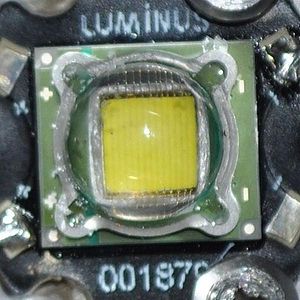Luminus
Luminus is a LED manufacturer based in Billerica, Massachusetts. They produce the SST-50 and SST-90 LED's (SSR-50 and SSR-90 are just the LED mounted to a star). These LED's compete with the SSC P7 and Cree MC-E, but the LED is a single emitter instead of 4 separate ones working together. The size of the emitter is similar so there is a large hotspot, but because the entire emitter lights up, SST-50 lights are less prone to a donut hole of darkness at the center of the beam.

SST-50
The SST-50 is 2.2mm x 2.2mm (5 mm²) drawing up to 5 amps while outputting up to 1250 emitter lumens. This is a big current draw for a flashlight and batteries and produces a large amount of heat, therefore the LED's are driven lower than maximum. Flashlights using this LED are capable of 500 lumens of output on one 18650 li-ion cell and up to 900 lumens using 2 18650's. web page
The SST-50 is used in the ThruNite Catapult, LumaPower D-Mini VX Ultra, Olight M21 Warrior Luminus, and the Tiablo AS50.
Here are the Brightness Bins for the SST-50. Note that unlike Cree, Luminus gives benchmarks at some current per mm² instead of just a current level to the LED.
| Bin | 1750mA (350mA/mm²) |
2800mA (700mA/mm²) |
5000mA (1000mA/mm²) |
|---|---|---|---|
| F | 275-350 | 413-525 | 635-823 |
| G | 350-425 | 525-638 | 823-999 |
| H | 425-500 | 638-750 | 999-1175 |
| J* | 500-600 | 750-900 | 1175-1410 |
| K | 600-700 | 900-1050 | 1410-1645 |
SST-90
The SST-90 is 3mm x 3mm (9mm²) drawing up to 9 amps while outputting up to 2250 emitter lumens. web page
| Bin | 3200mA (350mA/mm²) |
5000mA (700mA/mm²) |
9000mA (1000mA/mm²) |
|---|---|---|---|
| K | 600-700 | 882-1029 | 1410-1645 |
| L | 700-850 | 1029-1250 | 1645-1998 |
| M | 850-1000 | 1250-1470 | 1998-2350 |
| N* | 1000-1200 | 1470-1764 | 2350-2820 |
| P | 1200-1450 | 1764-2132 | 2820-3408 |
CBM-360
The CBM/CSM-360 is four SST-90 dies mounted on a single device. It is designed as a replacement for high power illumination lamps. web page
Tint Bins
Luminus uses tint bins based on ANSI White groupings, but they are expanded and subdivided. Each quadrangle is subdivided into four quadrants plus there are additional regions outside of ANSI. In product numbers, the tint bin is given towards the end, just before the last 3 digits which indicate a wavelength. Other parts of the product number give the ANSI CCT value:
| Bin | Name | Temperature |
|---|---|---|
| DL | Daylight | 6500-5000K |
| CL | Cool white | 5000-4000K |
| WT | White | 4500-3500K |
| WR | Warm white | 3500-2700K |
Luminus also assigns a CRI codes with S being 70, M is 83, and H is 92.
See Luminus' Phlatlight Binning and Labeling guide for more information.